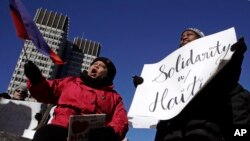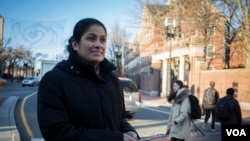While she is busy cleaning offices or shoveling snow, Doris Reina-Landaverde, a custodian at Harvard University, places her worries aside. She belongs to a labor union and insists the money isn't bad.
But once her shift ends, it's another story. A Salvadoran recipient of Temporary Protected Status (TPS) — a humanitarian relief program granted to nationals of countries reeling from man-made or environmental crises — Reina-Landaverde has a past of clinical depression, a condition that culminated from sexual harassment as a child, and which she could no longer afford to treat on a $114 monthly salary in El Salvador. In 2000, she completed a perilous three-month journey across Mexico's Sonoran desert.
Today, things would be good at her Boston home, except that her TPS immigration status, which has afforded her the right to live and work legally in the U.S. since 2001, expires in September 2019. That means she'll be out of a job. And it raises question marks for her family's next destination, despite the fact that her daughters are U.S.-born.
"I cried until I couldn't anymore, out of fatigue," Reina-Landaverde said of the January announcement by the Trump administration. That's when her attitude shifted.
"I have a year and a half to do something," she told herself.
WATCH: Boston's Salvadorans, Haitians Form Alliance Over Temporary Immigration Status
So Reina-Landaverde co-founded the Harvard TPS Coalition, fighting on behalf of TPS holders across U.S. universities, and riding a newfound wave of confidence that could be seen among others, too.
Across their Boston communities, they had found common ground through similar experiences of discrimination and despair.
Into the spotlight
Last week, eight TPS holders from El Salvador and Haiti, joined by the nonprofit organization Centro Presente, filed a federal lawsuit in Boston challenging President Donald Trump and the U.S. Department of Homeland Security's (DHS) decision to terminate TPS designation for some countries as "impermissibly infected by invidious discrimination on the basis of race, ethnicity and/or national origin."
When the decision to end TPS for Haiti was made in November, DHS said the quality of life on the island had improved, and determined the country was able to "safely receive traditional levels of returned citizens," nearly eight years after a devastating earthquake killed over 200,000 and displaced more than a million others.
But in January, three days after the decision to end the same protections for 262,500 Salvadorans, Trump reportedly referred to Haiti and African nations as "s---hole countries" during a closed-door immigration meeting with lawmakers.
The lawsuit's plaintiffs called the president's remarks part of a "clear and unfortunate thread" directed toward Latino and black immigrants.
In response to an email from VOA, the DHS's acting press secretary, Tyler Houlton, wrote that it does not comment on pending litigation, as a matter of policy. The White House did not respond to a separate request.
Backs to the wall
Geralde Gabeau, founder and executive director of the Boston-based Immigrant Family Services Institute (IFIS-USA), agrees with the basis of the lawsuit and what she called a "very aggressive narrative" from the Trump administration alongside the TPS decision.
Gabeau and Pastor Dieufort Fleurissaint — who leads weekly Christian services in Haitian Creole, French and English — have found in their meetings with Haitian TPS recipients that fear has struck hardest among families with children.
Some have moved to Canada, 350 kilometers (217 miles) north of Boston, despite no guarantees that they will qualify for asylum there.
"Those that left don't have any idea if they can remain after," said Fleurissaint. "In Canada … as long as they don't approve your application, you are being chased, just to be deported right away."
Among those contemplating a similar move is Reina-Landaverde. She worries about the violence and threat of kidnapping if she were to bring her three U.S.-born daughters — ages 4, 6 and 11 — with her to El Salvador.
Her sentiment is felt far and wide. According to the Center for Migration Studies, an estimated 273,000 U.S.-born citizens are children of TPS beneficiaries from El Salvador, Honduras and Haiti.
Inevitably, with TPS termination dates set for next year, family conversations surrounding the future of Boston's mixed-status households have become commonplace. Kids talk about it at school.
"This is a message coming from the highest levels of [the U.S.] government, and that's plastered all over the media, and so it's hard to be immune to that," Celina Barrios-Millner, who leads immigrant integration efforts for the city of Boston through a fellowship funded by the Barr Foundation, a Boston philanthropic group.
"So we are hearing of students feeling fearful, being called names because of their perceived immigration status," she told VOA.
The occurrences continue despite a citywide information campaign in Boston public schools to support immigrant families and ensure "messages of welcoming," according to Barrios-Millner.
Reina-Landaverde recalled a recent incident in which a classmate told her 11-year-old daughter that she would be deported.
"That day on, my daughter calls me in the morning and in the afternoon, concerned, asking if I'm OK — if I'm going to arrive home OK," she said.
The 39-year-old Salvadoran struggles to maintain her composure while describing the conversations she has with her 11-year-old:
"It's difficult to see my daughter cry, telling me, 'I don't want to leave.'
"She asks me, 'Mom, why can't I have a life like the other kids that are [also] U.S. citizens? Why do I have to think if something might happen to you?' "
Born of necessity and faith
Despite Massachusetts' progressive political reputation, José Palma, a TPS recipient from El Salvador who coordinates the state's TPS Committee, feels the state "falls short on action" for its undocumented population.
"You have to remember that in Boston, they piloted the famous Secure Communities program, which practically combines the work of the police with immigration [officials]," he said.
Palma was referring to a 2006 deportation pilot program that relied on cooperation between local, state and federal agencies. Former Massachusetts Governor Deval Patrick opted out in 2011. It was restarted by Trump in 2017, shortly after he assumed office.
Like Palma, Gabeau of the Immigrant Family Services Institute feels that local resources available for TPS recipients are slim.
"It's a world of difference between those who are privileged and those who are not, and that's the reason why we have to build our community," Gabeau said of Boston's minority immigrant groups. "Whenever something is impacting one member of our community … the whole community [must] stand."








